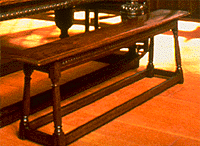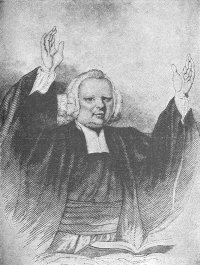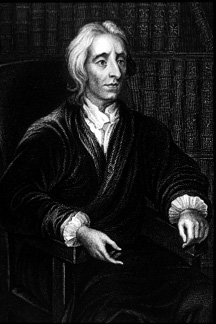|
Narrator's
Comments
|
Forum
Participants' Discussion
|
| Come
on, my new friend, let's find a seat before the room fills. We are expecting
a high turnout of the area's leaders, and possibly some members of Parliament
will be in attendance. Slavery seems to be one of the most prominent issues
within our contemporary society. At almost every gathering, men with investments
in the trade, as well as abolitionists, find their passions excited. Perhaps
you may do the same today... |
|
|
|
| Welcome,
gentlemen. I, Mr. Matthews, attend this forum today on behalf of Granville
Sharp and all opponents of slavery to enlighten you about the evils
of the institution, specifically in how it pertains to the rights
and status of the enslaved in our empire. |
| As
you may or may not know, Mr. Sharp defended one of our negro citizens
in petitioning for his freedom before the judiciary of this great
nation in 1772 (10). As a result,
James Somerset, the negro in question, obtained his freedom. The court
held that "a state of slavery is of such a nature that it is
incapable of being introduced on any reasons, moral or political,
but only by positive law...whatever inconveniences, therefore may
follow from this decision, I cannot say this case is allowed or approved
by the law of England; and therefore, the black must be discharged"
(11). This is the first step in freeing
our black brethren, but it is not enough. |
|
| While
the case Mr. Matthews cites sounds like it abolishes slavery, Justice Mansfield's
(more on the
case can be found at the ECE site,
"Slavery in Eighteenth Century England" in the "Mansfield
Case" page) language
suggests that only Parliament has the power to decide the status of slaves
in Britain. Though this opinion was a significant contribution to the emancipation
movement, it did not abolish the trade or end the practice of slavery. It
benefited the slaves in England and Ireland, but did nothing for slaves
in the West Indies. |
|
|
|
| Pardon
me, Mr. Matthews, but this case is rather a detriment to the negro,
as he is in great need of our enlightenment and exposure to religion.
Additionally, the court, realizing the delicacy of this matter, wisely
put the control of the fate of slavery in the hands of Parliament.
And, Parliament has wisely decided to consider not only the broad
economic interest of England, but also the interests of the negro,
and has, therefore, chosen not to abolish the trade. |
| Slavery
is actually a humanitarian institution. George Whitfield, a renowned
preacher and orator, said that we should participate in holding slaves
to "lay a foundation for breeding up [slaves'] posterity and
nurture and admonition of the Lord" (12). |
|
| That
was a very ethnocentric argument. He basically implied that blacks are savages
and need the virtuous white man to save them from themselves. Yet, these
same "humanitarian" men subjected their slaves to extreme cruelty
and abuse during the middle passage. (For
more on the middle passage, please visit the ECE
site, "Slavery
in Eighteenth Century England".) The argument
presented here fails to recognize that while doing blacks this "service,"
it still denies them their basic natural rights. |
|
| |
That's an interesting argument, sir, but your humanitarian policy does not
grant blacks the natural rights that all men are entitled to. As John Locke
might say, every man is free from absolute, arbitrary power; a man cannot
enslave himself to any one...nobody can give more power than he has himself
(13). He also says, "Slavery is so
vile and miserable an Estate of Man...that 'tis hardly to be conceived,
that an Englishman...should plead for't"(14).
You see, blacks are under the arbitrary power of whites- we prevent them
from living as they would otherwise. We have no right to deny these people
their autonomy. |
| That
was a pretty decent rebuttal, but as Mr. Matthews does not know, John Locke
owned slaves. He also drafted the Fundamental Constitutions of Carolina,
which granted absolute power over slaves (15).
Therefore, Locke's theories did not reflect his actual practices. Many people
in the eighteenth century opposed the idea of political slavery as Locke
suggests, but did not find fault in African slavery. This is because blacks
were not considered fully human according to the dominant viewpoint. Because
blacks were not fully human, they were not afforded the same natural rights
as white British citizens. The question of the humanity of slaves, while
important in the political realm, was actually more relevant in the equally
prevalent arguments of the clergy. Let's continue on to the religious
viewpoints. |
|



